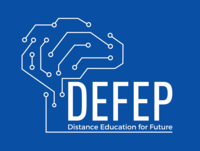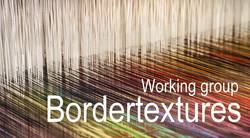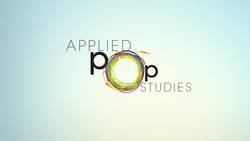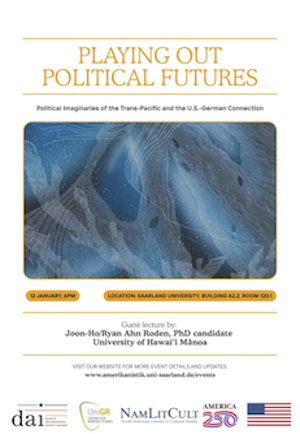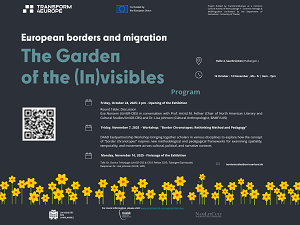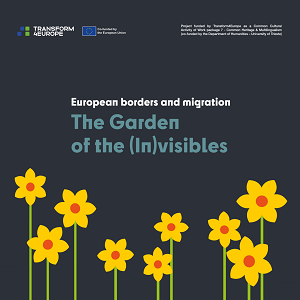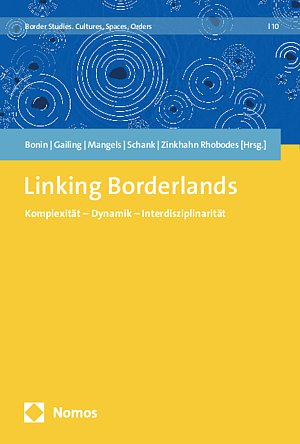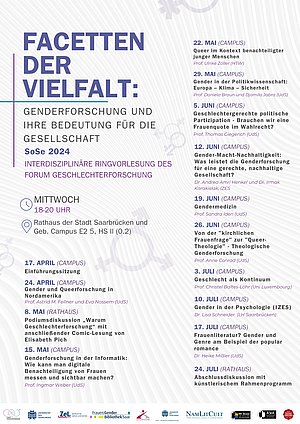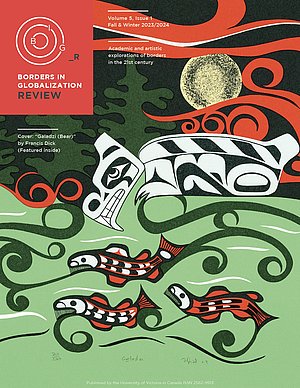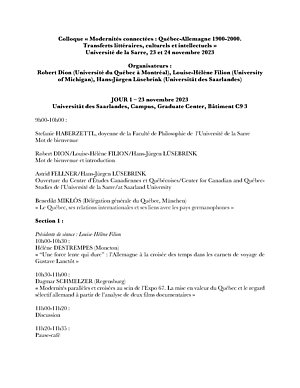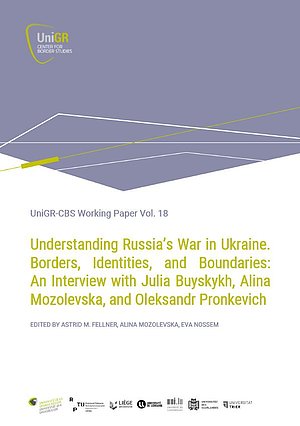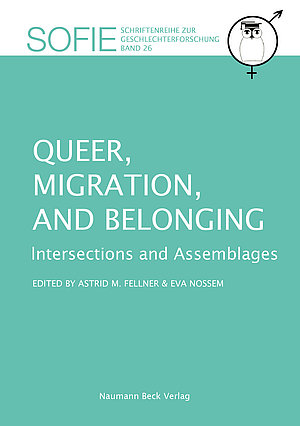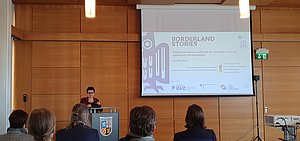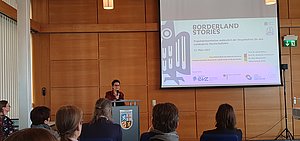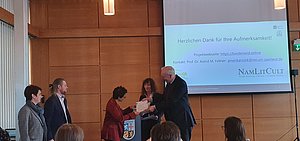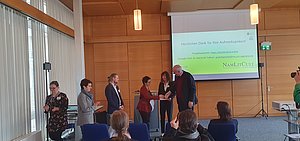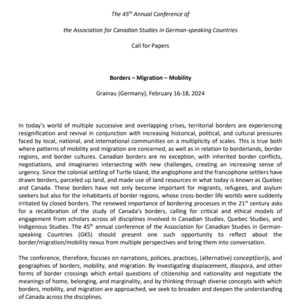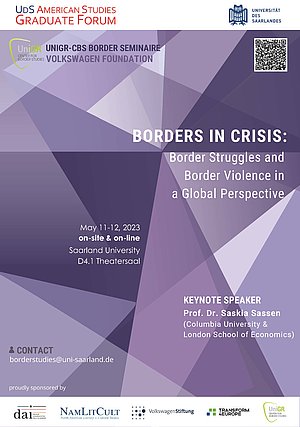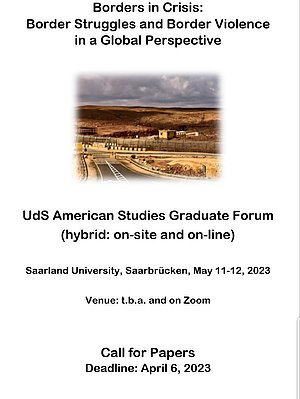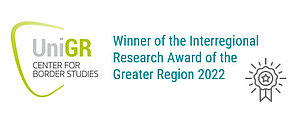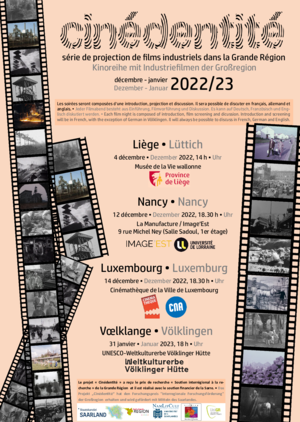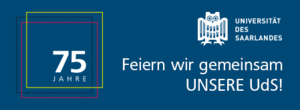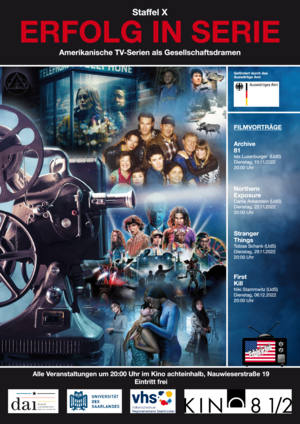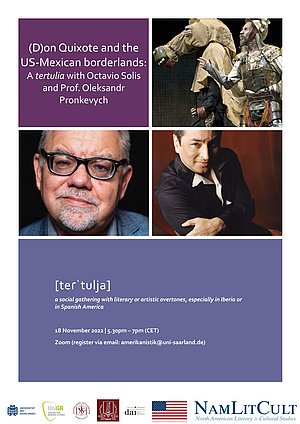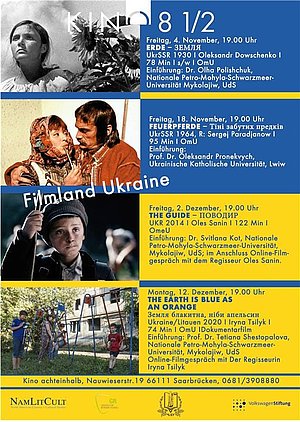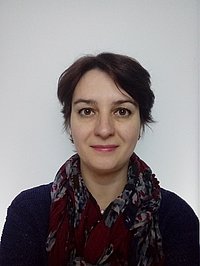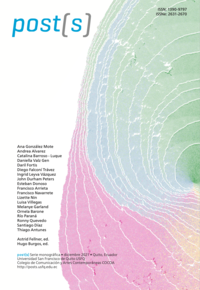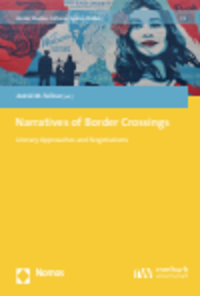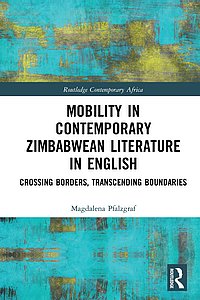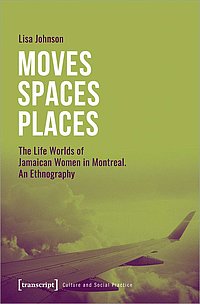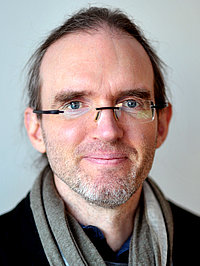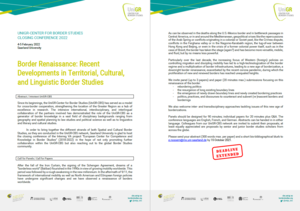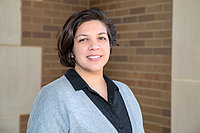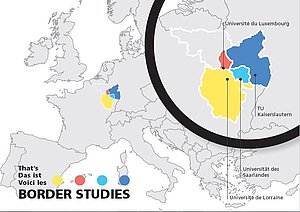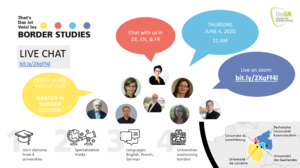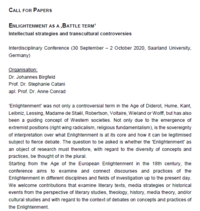Legal notice - Impressum
Data Protection - Datenschutz
News
Guest Lecture by Joon-Ho/Ryan Ahn Roden
Playing out Political Futures: Political Imaginaries of the Trans-Pacific and the U.S.-German Connection
Saarland University, building A2.2, room 120.1
12 January 2026, 6pm
Free Admission
In every conversation of security, diplomacy, and the path to future polity, there is the imaginary that it is fed upon. For every concern of socioeconomic crisis and political instability, there is the simulation meant to address it. By every medium from which the future is projected, from the classroom emulation session to the symposium’s simulation exercise, play becomes the vessel from which we build our political realities.
The 21st century marks a period of rapidly increasing climate-induced crisis, and mass securitization that has reshaped socioeconomic agreements and practices of militarization, especially across the Pacific. It is overwhelmingly critical to take a lens to the legacies of violence and state making, their contemporary repercussions, and the form of futures they indicate throughout the Trans-Pacific region.
Joon-Ho/Ryan Ahn Roden is a PhD Student with the Department of Political Science at the University of Hawaiʻi at Mānoa – specializing in areas of Indigenous Politics and Alternative Futures – and a visiting scholar with the North American Literary and Cultural Studies program at Saarland University. His talk delves into the practices of play in designing political futures, looking into the limits of political realities they embody, and how a decolonial imaginary can be fostered and centered for the future of U.S.-German Cooperation.
"Garden of the (In)Visibles"
T4EU-Exhibition & Program
Date: Thursday, 16 October to Tuesday, 12 November 2025 | Mon-Fri 8:00 AM–7:00 PM
Venue: Halle 4, Halbergstr. 4, Saarbrücken
The Transform4Europe exhibition “Garden of the (In)Visibles” is currently on display in Saarbrücken!
The traveling exhibition “Garden of the (In)Visibles” showcases objects abandoned by migrants in the borderlands between Croatia, Slovenia, and Italy, which were collected in 2023 by students and lecturers/researchers from the University of Primorska (Koper) and the University of Trieste as a common project of the Transform4Europe (T4EU) Alliance.
A series of events will take place to accompany the exhibition - here is the program:
- Friday, 24 October 2025, 2 pm - Opening of the Exhibition @ Halle 4
Round Table Discussion: Eva Nossem in conversation with Prof. Dr. Astrid M. Fellner and Dr. Lisa Johnson - Thursday, 30 October 2025, 8 pm - Film Screening “Mein Leben, mein Film” (Ukrainian with German subtitles), Unifilm @ Audimax, UdS
- Friday, 7 November 2025, 2-5 pm - Workshop “Border Chronotopes: Rethinking Method and Pedagogy” - online
Friday, 7 November 2025, 3 pm: Dr. Carolin Leutloff-Grandits: “The Balkans as EU Borderland: Materialities and Liminalities of Migration” - Monday, 10 November 2025, 5 pm: Finissage of the Exhibition @ Halle 4
Dr. Danica Trifunjagic (UniGR-CBS & CEUS Fellow 2025): “Limitless Borders in Post-Yugoslav Cultural Spaces”
Response Dr. Lisa Johnson
"Garden of the (In)Visibles"
T4EU-Exhibition in Saarbrücken
Date: Thursday, 16 October to Tuesday, 12 November 2025 | Mon-Fri 8:00 AM–7:00 PM
Venue: Halle 4, Halbergstr. 4, Saarbrücken
The Transform4Europe exhibition “Garden of the (In)Visibles” is coming to Saarbrücken!
The traveling exhibition “Garden of the (In)Visibles” showcases objects abandoned by migrants in the borderlands between Croatia, Slovenia, and Italy, which were collected in 2023 by students and lecturers/researchers from the University of Primorska (Koper) and the University of Trieste as a common project of the Transform4Europe (T4EU) Alliance.
These things, abandoned after a long and difficult journey on foot by people from various backgrounds, are everyday objects for eating, sleeping, covering, and healing. These objects bridge tangible heritage (material remnants like clothing and documents) and intangible heritage (the personal stories and emotions these objects carry). The “Garden of the (In)Visibles” recontextualizes these objects, transforming them into “talkative” artifacts that provoke reflection on identity, migration, borders, and European heritage.
The traveling exhibition will be hosted at seven sites of the Transform4Europe university alliance across Europe. In Saarland, the exhibition comes to the symbolic core of the Schengen heartland. Here, where the 40th anniversary of the Schengen Treaty is being celebrated extensively in 2025, the exhibition invites critical reflection on the porous and contested nature of Europe's borders as well as European colonial and imperial histories. The exhibited objects challenge the current European heritage framework, act on notions of “identity” and “otherness,” and encourage reflection and engagement about migration, borders, and “Europe.”
On display at Halle 4, Halbgerstr. 4, 66121 Saarbrücken. Open Mon-Fri 8:00 AM-7:00 PM
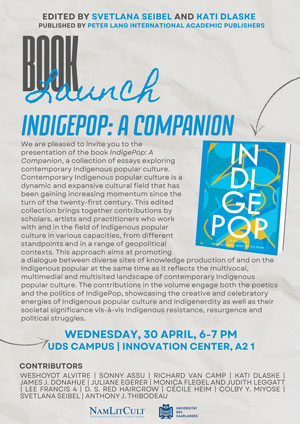
BOOK LAUNCH
IndigePop: A Companion
Date: Wednesday, 30 April 2025 | 6:00–7:00 PM
Venue: Innovation Center, A2 1, Saarland University
The Department of North American Literary and Cultural Studies is pleased to announce the launch of the edited volume IndigePop: A Companion, edited by Dr. Svetlana Seibel and Dr. Kati Dlaske.
This collection offers a comprehensive exploration of contemporary Indigenous popular culture, a dynamic and expanding field that has gained significant momentum since the early twenty-first century. Bringing together contributions from scholars, artists, and practitioners working in diverse geopolitical contexts, *IndigePop: A Companion* reflects the multivocal, multimedial, and multisited nature of Indigenous popular culture today.
Contributors include:
Weshoyot Alvitre, Sonny Assu, Richard Van Camp, Kati Dlaske, James J. Donahue, Juliane Egerer, Monica Flegel and Judith Leggatt, Lee Francis 4, D. S. Red Haircrow, Cécile Heim, Colby Y. Miyose, Svetlana Seibel, and Anthony J. Thibodeau.
We warmly invite all students, faculty members, and anyone interested in Indigenous Studies, Popular Culture, and Cultural Studies to join us for the presentation and discussion.
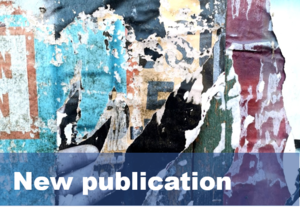
Handbook Article "Cultural Border Studies" Published
The recently published Handbook of Cultural Studies (Nesselhauf & Weber 2025) presents Cultural Border Studies as an interdisciplinary research field, highlighting its evolution and methodologies. In their contribution, Astrid M. Fellner (Saarland University) and Christian Wille (University of Luxembourg) explore how cultural perspectives have expanded the scope of border studies.
The article traces the development of Cultural Border Studies between the cultural turn in border studies and the border turn in cultural studies, examining everyday and popular culture perspectives on borders. It also provides insights into key research approaches, institutional frameworks, and future challenges in this dynamic field.
More information: orbilu.uni.lu/handle/10993/54705
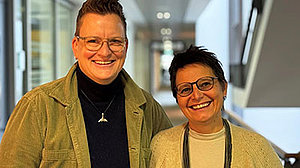
Phantom borders or: How long do you feel borders?
For the past decade, the University of the Greater Region (UniGR) has been offering Border Studies—a truly cross-border program that allows students to explore the complexities of borders from multiple perspectives. As part of the UniGR network, which includes the universities of Kaiserslautern-Landau, Liège, Lorraine, Luxembourg, Saarland, and Trier, students can attend courses at all seven institutions.
To mark this milestone, Professor Dr. Astrid Fellner and Eva Nossem from Border Studies reflect on a decade of research and teaching. In a recent interview for SR.de, they discuss the US border with Mexico, Saarlanders of Italian descent and the feeling of the border.
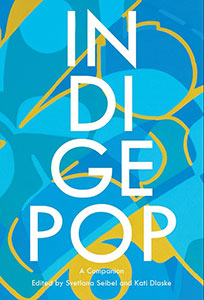
NEW PUBLICATION
We are delighted to announce the publication of the volume IndigePop: A Companion, co-edited by Svetlana Seibel (Saarland University) and Kati Dlaske (University of Helsinki) and published by Peter Lang (Genre Fiction and Film Companions, Vol. 16, Series Editor: Simon Bacon).
Summary
Contemporary Indigenous popular culture is a dynamic and expansive cultural field that has been gaining increasing momentum since the turn of the twenty-first century. This edited collection brings together contributions by scholars, artists and practitioners who work with and in the field of Indigenous popular culture in various capacities, from different standpoints and in a range of geopolitical contexts. This approach aims at promoting a dialogue between diverse sites of knowledge production of and on the Indigenous popular at the same time as it reflects the multivocal, multimedial and multisited landscape of contemporary Indigenous popular culture. The contributions in the volume engage both the poetics and the politics of IndigePop, showcasing the creative and celebratory energies of Indigenous popular culture and Indigenerdity as well as their societal significance vis-à-vis Indigenous resistance, resurgence and political struggles.
Contributors
Weshoyot Alvitre | Sonny Assu | Richard Van Camp | Kati Dlaske | James J. Donahue | Juliane Egerer | Monica Flegel and Judith Leggatt | Lee Francis 4 | D. S. Red Haircrow | Cécile Heim | Colby Y. Miyose | Svetlana Seibel | Anthony J. Thibodeau
Bibliographical information
Seibel, Svetlana and Kati Dlaske (eds.). IndigePop: A Companion. Peter Lang Ltd. International Academic Publishers, 2024. DOI: 10.3726/b21220
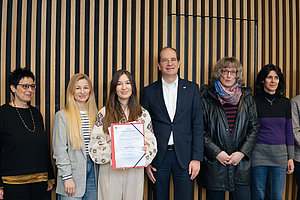
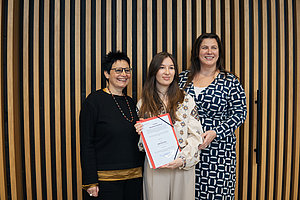
Our American Studies Student Viktoriia Karakatsii Receives the DAAD Prize 2024
We are proud to announce that Viktoriia Karakatsii, a talented student in the American Studies program at Saarland University, has received the DAAD Prize 2024 for Outstanding Achievement for International Students. This highly regarded award recognizes Viktoriia’s exceptional academic performance and outstanding commitment to social and cross-cultural projects.
Alongside her academic work, she has been actively involved in significant initiatives that transcend cultural boundaries and highlight important global issues. As a volunteer with UkraineFreundeSaar, Viktoria has been involved in a variety of projects, including documenting cultural events through photography and her key role in the creation of the documentary film “Mein Leben – Mein Film.” This project gave Ukrainian refugees a voice, showcasing their resilience and stories.
Recalling this achievement, Viktoriia expressed her gratitude to Saarland University, particularly Prof. Dr. Astrid Fellner, for her unwavering support and encouragement.
We congratulate Viktoriia on this outstanding achievement!

"Living and Working on the European Borders"
The coordinators of UniGR-CBS from Saarland University Prof. Astrid Fellner and Eva Nossem were guests in the SR studio. The talk focused on border studies in the Greater Region, highlighting the achievements of the first interdisciplinary competence center of the University of the Greater Region “UniGR-Center for Border Studies”. In addition, a unique academic offer was presented: the trinational master’s program in border studies.
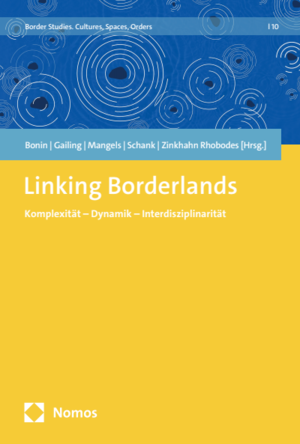
BOOK LAUNCH
Linking Borderlands: Komplexität - Dynamik - Interdisziplinarität
We are pleased to invite you to the presentation of the book, Linking Borderlands: Complexity - Dynamics - Interdisciplinarity, which explores the complexity and dynamics of European border regions as zones of contact and transition. This interdisciplinary collection is the result of the collaborative research project "Linking Borderlands: Dynamics of Peripheral Border Regions," focusing on the SaarLorLux+ and Brandenburg/Lubuskie border areas.
When? 20 November, 2024 at 16:00
Where? Online via Zoom
This event is part of the Research Factory series and offers an open platform for academics, practitioners, and interested attendees to discuss the intersections of theory, practice, and policy within European borderlands research.
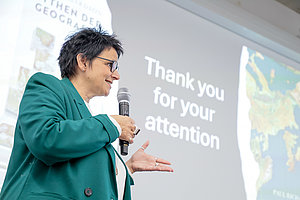
UniGR-CBS Jubilee Conference
On October 17 and 18, 2024, more than 80 researchers celebrated ten years of border studies in the Greater Region. To mark the jubilee, border researchers from the UniGR-Center for Border Studies (UniGR-CBS) met with international scholars from 30 countries to discuss border struggles and border alliances.
Further information about the UniGR-CBS Jubilee Conference:
center-border-studies.uni-gr.eu/index.php/en/unigr-cbs/conferences/conference-2024-border-struggles-and-cross-border-alliances

Saarland University and University of Alicante discuss potential T4EU collaborations
Professor Astrid Fellner, Chair of North American Literary and Cultural Studies here at Saarland University, recently visited the English Department at the University of Alicante within the framework of T4EU to explore potential collaborations between the two departments. She was joined by Eva Nossem from Saarland University's UniGR-Center for Border Studies and Carolina Madelaine, Director of the OGPI, the University of Alicante's Institutional Project Management Office.
NEW PUBLICATION!
Linking Borderlands: Komplexität - Dynamik - Interdisziplinarität
We are happy and proud to announce that the volume "Linking Borderlands: Komplexität - Dynamik - Interdisziplinarität" is now out! The volume is co-edited by Sara Bonin, Prof. Dr. Ludger Gailing, Dr.-Ing. Kirsten Mangels, Dr. Tobias Schank, Dr. Dagna Zinkhahn Rhobodes and it is published with Nomos in the series Border Studies: Cultures, Spaces, Orders. The publication is the outcome of the BMBF-funded project Linking Borderlands. With contributions by
Dorte Jagetic Andersen | Lola Aubry | Kamil Bembnista | Benjamin Blaser | Sara Bonin | Astrid M. Fellner | Ludger Gailing | Kirsten Mangels | Leonie Micka-Monz | Eva Nossem | Karina Pallagst | Nino Pfundstein | Claudia Polzin-Haumann | Julia Lenz | Martin Reents | Nicole Richter | Tobias Schank | Stefanie Thurm | Céline Uhrweiler | Peter Ulrich | Florian Weber | Georg Wenzelburger | Dagna Zinkhahn Rhobodes
Abstract:
This book shows the complexity and dynamics of European border regions as zones of contact and transition. It is the result of the joint interdisciplinary project ‘Linking Borderlands: Dynamics of Cross-Border Peripheries’, which compares the Greater Region of SaarLorLux+ and the border region Brandenburg/Lubuskie. The contributions the book contains expand on the theoretical foundations in this respect and highlight practical fields of application in the areas of policy transfer and learning, social practice and language in the context of vocational training, cultural negotiation processes in film, planning cultures and energy transition. Research and practice are in constant interaction, so the book provides both a snapshot of the current state of research on this subject and a starting point for further research projects.
Here is the full bibliograhical reference for the Introduction:
Bonin, S., L. Gailing, K. Mangels, T. Schank, and D. Zinkhahn Rhobodes (eds.). Linking Borderlands: Komplexität - Dynamik - Interdisziplinarität. Baden Baden: Nomos, https://doi.org/10.5771/9783748919667.
You find the publication here.
NEW PUBLICATION!
Borders in Globaization Review: "Border Renaissance"
We are happy and proud to announce that our special section "Border Renaissance" is now out! The issue is co-edited by Astrid M. Fellner, Eva Nossem, and Christian Wille and features the following articles:
- Introduction: What is Border Renaissance? (Astrid M. Fellner, Eva Nossem)
- Border Renaissance in a Time of Border Perplexity? The Question of Renaissance/Renascence in a Post-Globalization World (Victor Konrad)
- European Border Region Studies in Times of Borderization: Overview of the Problem and Perspectives (Christian Wille)
- The Resurrection of Borders Inside of the Schengen Area and its Media Representations (Ondřej Elbel)
- Bordering Inclusion and Exclusion in the Discourses of Marine Le Pen and Eric Zemmour (Alina Mozolevska)
- Un/Certain Borderlands: Multimodal Discourses of Border Renaissance in Polish and German Media (Kamil Bembnista)
- Bordering Democracies, Democratising Borders (Marco Mogiani)
- Britain’s Imperial Past and Contemporary Borders in Adichie’s Americanah and Zadie Smith’s ‘Fences’ (Kirsten Sandrock)
Abstract:
This issue investigates the return to borders, gauging the impact of this recent renaissance of borders in political and media discourses and cultural
representations of borders and borderlands. The geographical focus of the individual papers lies primarily on Europe with brief references to North America and Asia. Zooming in on questions of recent border conflicts, tensions, and struggles, on the one hand, and questions of identity, language practices, and forms of belonging, on the other, the essays highlight border rebirth and revival, also presenting new research on recent developments in territorial/spatial and cultural border studies. Coming from a wide variety of disciplines, such as geography, cultural studies, literature, linguistics, and political sciences, the authors explore the renewed interest in borders and the many instances of borderizations.
Here is the full bibliograhical reference for the Introduction:
Fellner, A., and E. Nossem. “Introduction: What Is Border Renaissance? ”. Borders in Globalization Review, Vol. 5, no. 1, Mar. 2024, pp. 68-77, doi:10.18357/bigr51202421521.
You find the publication here.
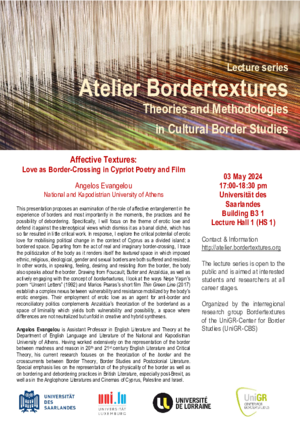
Guest: Dr. Angelos Evangelou (National and Kapodistrian University of Athens)
Dr Evangelou will visit Saarland U from May 01 - 09, 2024.
Dr. Angelos Evangelou is Assistant Professor in English Literature and Theory at the Department of English Language and Literature of the National and Kapodistrian University of Athens. Having worked extensively on the representation of the border between madness and reason in 20th and 21st century English Literature and Critical Theory, his current research focuses on the theorization of the border and the crosscurrents between Border Theory, Border Studies and Postcolonial Literature. Special emphasis lies on the representation of the physicality of the border as well as on bordering and debordering practices in British Literature, especially post-Brexit, as well as in the Anglophone Literatures and Cinemas of Cyprus, Palestine and Israel.
Dr. Angelos Evangelou will hold a lecture on May 3rd at 5PM about "Affective Textures: Love as Border-Crossing in Cypriot Poetry and Film" in building B3 1, HS1. Online participation is possible, please register at borderstudies@uni-saarland.de; all informations atelier.bordertextures.org
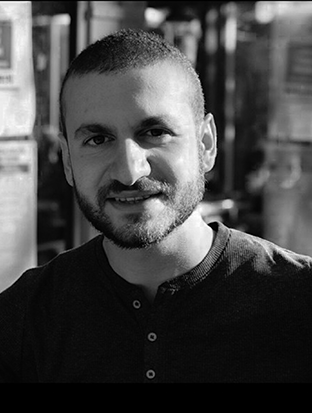
Guest: Betuhan Lüleci (Charles University, Prague)
Visiting Doctoral Student
Nuri Batuhan Lüleci is a PhD student in the Department of Anglophone Literatures and Cultures at Charles University in Prague. He holds an MA in National and Transnational Studies: Literature, Culture, Language (NTS) from the University of Münster. Additionally, he has completed a semester at the University of St Andrews, a full academic year at the University of North Carolina at Asheville, and most
recently, was a visiting doctoral student at the Oxford Centre for Life-Writing. He is researching and writing at the conceptual intersections between and among life-writing, postcolonial studies, and critical theory. He is currently working on his dissertation entitled ‘Transgressive Life Writing and Exilic Criticism,’ focusing on the nexus between theory and lived experience in the life narratives of Frantz Fanon, Edward Said, and Stuart Hall. His most recent article, ‘The Rhetoric of Violence in Irvine Welsh’s Marabou Stork Nightmares,’ was published in Scottish Literary Review.
https://asls.org.uk/publications/periodicals/slr/
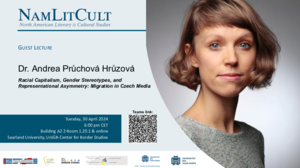
Guest: Dr. Andrea Průchová Hrůzová (Charles University, Prague)
Dr. Průchová Hrůzová will visit Saarland U from 29 April - 05 May 2024.
Guest Lecture “Racial Capitalism, Gender Stereotypes, and Representational Asymmetry: Migration in Czech Media”
30 April 2024, 6 pm
Further details: see poster.
Guest: Dr. Ewa Macura Nnamdi (University of Silesia in Katowice)
Dr Macura-Nnamdi will visit Saarland U from 22 - 28 April 2024.
Ewa Macura-Nnamdi is assistant professor at the Institute of Literary Studies (University of Silesia, Poland). She holds a doctorate in English literature (New Woman fiction of the late-Victorian period). Currently, her main research interests include postcolonial Anglophone literatures of Africa and African diaspora, postcolonial theories as well as refugees and migration in cinema and literature. She has published articles on, among others, Dambudzo Marechera, Rawi Hage, Abdulrazak Gurnah and Omar Khadr. Her recent publications include “Mouthwork” (ARIEL: A Review of International English Literature) and “Omar Khadr, Guantánamo and Carceral Gastronomy” (European Journal of English Studies). She has just been awarded a research grant from the National Science Centre for her project on Fictions of Water: Refugees and the Sea.

10 Years of Border Studies in the Greater Region
The UniGR-CBS celebrates its 10th anniversary
In 2024, the UniGR-Center for Border Studies celebrates its 10th anniversary!
We're organizing lots of exciting events and we invite you to party with us!
Stay tuned...
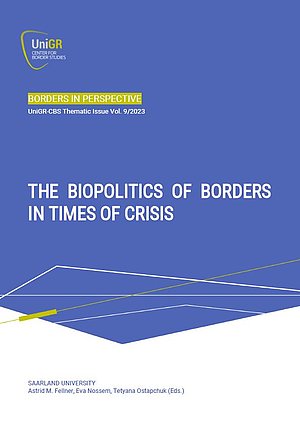
NEW PUBLICATION!
UniGR-CBS Thematic Issue "The Biopolitics of Borders in Times of Crisis"
We are happy and proud to announce that our thematic issue "The Biopolitics of Borders in Times of Crisis" is now out! The issue is co-edited by Astrid M. Fellner, Eva Nossem, and Tetyna Ostapchuk and features the following articles:
- Introduction: Borders, Biopolitics, and Crises in Europe and North America (Astrid M. Fellner, Eva Nossem)
- Artworks on the U.S.-Mexico Border: Architectural Responses Defying the Limit (Imen Helali)
- Resistance and Remembrance in Border Art: A Response to EU Border Violence in Tunisia (Anja Benedikt)
- No Room for Bare Life on Stage: The Biopolitics of Syrian Migrant Artists (Ruba Totah)
- Necropolitics at Sea: A Reading from Mediterranean Border Fiction (Silvia Ruzzi)
- Dismantling the Binary Opposition Between Reservation and City in Louise Erdrich’s Future Home of the Living God (Svitlana Kot)
- Reassessing the Periphery, Challenging the Re-Politicizing Struggles (Marco Mogiani)
- Of Saints, Saviors, and Smugglers: The capitane in the Mediterranean and the Border-Gender-Nexus (Eva Nossem)
Abstract:
This collection of essays pays attention to the biopolitical intricacies surrounding borders, with a particular focus on the Global North, encompassing North America and Europe. It dwells on the growing importance of biopolitical perspectives in Cultural Border Studies and aims at re-thinking Europe and the Americas through the crises and challenges they pose. By scrutinizing biopolitics, the negotiation of crises, and the state of exception in literature, the arts, and political discourse, this thematic issue probes the multifaceted dimensions of biopolitical control, highlighting the interplay between state authority and the lives of those impacted by these regulations. Border biopolitics then emerges as a complex nexus of authority, surveillance, control, and management of human lives on, at, and across borders.
Here is the full bibliograhical reference:
Fellner, A. M., Mozolevska, A. and Nossem, E. (2023): Understanding Russia’s War in Ukraine. Borders, Identities and Boundaries: An Interview with Julia Buyskykh, Alina Mozolevska, and Oleksandr Pronkevich. In: UniGR-CBS Working Paper Vol. 18, DOI: 10.5281/zenodo.8179180.
You find the publication in the publication series Borders in Perspective on the website of our UniGR-Center for Border Studies; click here.
New Center on Canadian and Québec Studies at UdS
On 23 and 24 November 2023, an international conference in the field of Quebec Studies will take place at Saarland University. The conference "Modernités connectées : Québec-Allemagne 1900-2000. Transferts littéraires, culturels et intellectuels" is organized by Robert Dion (Université du Québec à Montréal), Louise-Hélène Filion (University
of Michigan), and Hans-Jürgen Lüsebrink (Universität des Saarlandes).
On the occasion of this conference, Prof. Dr. Astrid M. Fellner and Prof. Dr. Hans-Jürgen Lüsebrink will inaugurate the new Centre d’Études Canadiennes et Québécoises de l’Université de la Sarre/Center for Canadian and Québec-Studies at Saarland University (23 November 2023, 9 am, Universität des Saarlandes, Campus, Graduate Center, Bâtiment C9 3).
We're looking forward to an interesting conference and to a (re-)newed and fruitful joint collaboration in Canadian and Québec Studies/Études Canadiennes et Québécoises at Saarland University!
- Oh and btw, if you are interested in Canadian & Québec Studies, don't forget about the ongoing lecture series "Virtual Canadian Studies" this winter semester in Thursday afternoon, 4pm, at Musiksaal!
NEW PUBLICATION!
UniGR-CBS Working Paper "Understanding Russia's War in Ukraine"
We are happy and proud to announce that our shared paper "Unterstanding Russia's War in Ukraine. Borders, Identities, and Boundaries is now out! The paper is co-edited by Astrid M. Fellner, Alina Mozolevska, and Eva Nossem and it is based on a roundtable on the war in Ukraine we held in June 2022 with Julia Buyskykh, Alina Mozolevska, and Oleksandr Pronkevych.
Here is the full bibliograhical reference:
Fellner, A. M., Mozolevska, A. and Nossem, E. (2023): Understanding Russia’s War in Ukraine. Borders, Identities and Boundaries: An Interview with Julia Buyskykh, Alina Mozolevska, and Oleksandr Pronkevich. In: UniGR-CBS Working Paper Vol. 18, DOI: 10.5281/zenodo.8179180.
You find the publication in the Working Paper series on the website of our UniGR-Center for Border Studies; click here.
NEW PUBLICATION!
SOFIE Vol. 26 Queer, Migration, and Belonging
We are happy and proud to announce that our edited volume Queer, Migration, and Belonging: Intersections and Assemblages is now out! The paper is co-edited by Astrid M. Fellner and Eva Nossem and features papers by renowned scholars in the field. It appears as volume 26 in the series SOFIE: Schriftenreihe zur Geschlechterforschung. The idea for this volume was born out of our conference/workshop Intersections: Queer / Migration / Legality, held in 2017 at FrauenGenderBibliothek Saar.
Here is the full bibliograhical reference:
Fellner, A. M. and Nossem, E. (2023): Queer, Migration, and Belonging: Intersections and Assemblages. Naumann Beck
and the table of contents:
Katharina Kunze: Foreword - Astrid M. Fellner and Eva Nossem: Introduction: The Many Intersections of Queer, Migration, and Belonging - Part I Biopolitics and Homonationalism - Christian Klesse: On the Government of Bisexual Bodies. Asylum Case Law and the Biopolitics of Bisexual Erasure - Sarah French Brennan: Anxious Intersections. Queer Muslim Asylum Seekers in the Netherlands - Astrid M. Fellner: Queering Diversity. Belonging, Sexuality, and Decolonization in Canada - Part II (De)-Construction of Sexual and Gender Borders - Ahmed Hamila: Gay and Muslim in the French Banlieues. An Intersectional Reading of Homo-Ghetto by Franck Chaumont and Un homo dans la cité by Brahim Naït-Balk - Carmen Manektala Braun: Hopeful Assemblages in Unveiled/Fremde Haut. Representing the Figure of the Female Asylum Seeker as Becoming-Intersectional in Assemblage - Part III Solidarity and Coalition Building - Julie Abbou: Queer Solidarity Smashes Borders. A Politics of Solidarity with Silent Political Subjects - M. Katharina Wiedlack and Masha Neufeld: Queer(ing) Solidarity? Some Thoughts on Representation and Identity, Difference and Privilege
You can get the book at all the usual book sellers and you find it here on the publisher's website.
Winner Landespreis Hochschullehre 2022-23!
Winner of the Award for Teaching in Higher Education of the Saarland
We are proud to announce that our team teaching project "Borderland Studies“ (2022), in cooperation with Petro Mohyla Black Sea National University and funded by EVZ Foundation, has won the Landespreis Hochschullehre des Saarlandes (Award for Teaching in Higher Education of the Saarland).
Prof. Dr. Astrid M. Fellner, Prof. Dr. Olksandr Pronkevych, Dr. Alina Mozolevska, and Dr. Tobias Schank accepted the award on behalf of the entire team.
We would like to thank and congratulate all involved colleagues and highlight their exemplary border-crossing effort!
Call for Papers: Borders - Migration - Mobility
The 45th Annual Conference of the Association for Canadian Studies in German-speaking Countries has issued a Call for Papers under their theme Borders - Migration - Mobility.
The conference will take place on February 16-18, 2023 in Grainau, Germany.
Abstracts should be submitted no late than June 4, 2023 to gks@kanada-studien.de.
Find more information on the conference and the call for papers here.
Borders in Crisis: Border Struggles and Border Violence in a Global Perspective (2023)
The 9th Seminar of the UniGR-Center for Border Studies organised by Saarland University will take place on-site (D4.1) and online on the 11th and 12th May 2023.
Find more information and the full program here.
Call for Papers: "Borders in Crisis"
The annual Saarland University American Studies Graduate Forum will take place on May 11-12 2023. The forum invites advanced Master students, doctoral candidates, as well as junior scholars to present their current work-in-progress in a workshop-style setting. This year’s UdS American Studies Graduate Forum will be integrated into the Seminar Border Studies 2023 “Borders in Crisis,” organized by the UniGR-Center for Border Studies at Saarland University, and the VW-project “Borders in Crisis.”
We invite junior researchers in the field of Border Studies, American Studies, and related disciplines in our Transform4Europe network to submit their papers for the ASGF2023.
Presentations should be approximately 20 minutes in length and will be followed by a discussion and feedback round with all participants and experts. Abstracts of no more than 300 words should be submitted by April 6, 2023 to amerikanistik@mx.uni-saarland.de. Please include a brief bio (no more than 100 words).
For more information on the forum as well as potential paper topics, see the attached document.
In cooperation with: Deutsch-Amerikanisches Institut Saarland, Volkswagen Stiftung
Winner of the Interregional Research Award of the Greater Region 2022!
We are proud to announce that the interregional project "European Center for Competence and Knowledge in Border Studies“ (2018-2022) has won the Interregional Science Award of the Greater Region!
We would like to thank and congratulate all involved colleagues and highlight their exemplary border-crossing effort!
Cinédentité: Industrial films from the Greater Region
Four compilations of industrial films from the Greater Region will be shown over the next couple of weeks!
Please note the updated time for Völklinger Hütte!
4 December, 2 pm CET, Liège, Musée de la Vie Wallonne
12 December, 6:30 pm CET, Nancy, La Manufacture, 9 rue Michel Ney (Salle Sadoul, 1st floor)
14 December, 6:30 pm CET, Luxembourg, Cinémathèque de la Ville de Luxembourg
31 January, 6 pm CET, Völklingen, Weltkulturerbe Völklinger Hütte
75 Years Saarland University
2023 marks 75 years of Saarland University - and that should be celebrated!
We are proud to be a diverse European school, an attractive research facility in the region, and the home of various start-ups.
To observe this impressive anniversary there will be events and offers year round: concerts, theme weeks, lectures ... Let's celebrate together!
Erfolg in Serie Season X
Erfolg in Serie is back! Join us at Kino achteinhalb to watch and hear about four cult shows, always at 8 pm CET and free of charge!
Tuesday, 15 November 2022: Archive 81 (Isis Luxenburger)
Tuesday, 22 November 2022: Northern Exposure (Carrie Ankerstein)
Tuesday, 29 November 2022: Stranger Things (Tobias Schank)
Tuesday, 6 December 2022: First Kill (Niki Stammwitz)
Don Quixote and the US-Mexican Borderlands
Join us for a tertulia on "Don Quixote and the US-Mexican Borderlands" with Octavio Solis and Professor Oleksandr Pronkevych
Friday, 18 Novermber 2022
5:30 pm CET
Zoom-Registration at amerikanistik@uni-saarland.de
Screening of Ukrainian Movies
Coming soon, the screening of Ukrainian films and documentaries in Kino 8 ½
with English/German introduction and discussion
04.11. 2022 – 19.00 – EARTH (Ukrainian: Земля), a 1930 silent film directed by Alexander Dovzhenko, one of the top ten greatest films of all times by the International Film Critics Symposium.
18.11. 2022 – 19.00 – SHADOWS OF FORGOTTEN ANCESTORS (Ukrainian: Тіні забутих предків) – a 1965 film – classic of Ukrainian magical realist cinema directed by Sergei Parajanov.
02.12.2022 – 19.00 – THE GUIDE (Ukrainian: Поводир), a 2014 Ukrainian drama film about an American Boy and a Ukrainian blind bard (kobzar), directed by Oles Sanin.
12.12.2022 – 19.00 –THE EARTH IS BLUE AS AN ORANGE (Ukrainian: "Земля блакитна, ніби апельсин"), a 2020 documentary film about living in the front-line war zone, directed and written by Iryna Tsilyk.
Stand with Ukraine, watch Ukrainian
https://www.kinoachteinhalb.de/programm/filmreihen/35/filmland-ukraine
Global Classroom Ukraine-Saarland
in collaboration with DAI Saarland

NEW PROJECT!
We are very proud and grateful that our project "Global Classroom Ukraine-Saarland" has been granted and we're looking forward to a series of exciting events in collaboration with the German-American Institute DAI Saarland, taking place in the fall and winter of 2022.
Thank you very much to the U.S. Embassy in Germany for providing us with the necessary funds to realize this project!
Borders in Crisis: Discursive, Narrative, and Mediatic Border Struggles in Ukraine, Europe, and North America
funded by Volkswagen Foundation
Research project, Volkswagen Foundation funding line for displaced Ukrainian scholars, 2022-2023
NEW RESEARCH PROJECT!
As some have stated, Russia’s war in Ukraine is (supposedly) not so much about borders as it is about identity. We interpret this affirmation, which clearly is based on a rather narrow understanding of the concept of the ‘border,’ as an attempt, not to downplay the violent aggression on Ukrainian territory, but rather to highlight the particular role questions of identity play in this war, which is fought out also in the cultural sphere – in the realms of language, media, history, as well as cultural productions and sites, ranging from language policies, semiotic warfare and the censoring of media content, to the very material shelling of cultural sites.
Given the particular role of cultural productions in this war, and furthermore anticipating a rich cultural production emerging from the trauma of this war and the flight and displacement of millions of Ukrainians, we aim at shedding light onto the cultural construction of Ukrainian borders through an intertwined analysis of discursive, narrative, and mediatic negotiations of Ukrainian-European and Ukrainian-North American identities. Analyzing and interpreting constructions of national identities without falling into the trap of nationalism requires intertwined perspectives also across borders.
With this aim, we bring together shared expertise from literary and cultural studies, media studies, and linguistics in the fields of transnational American Studies as well as European Studies, and specifically Ukrainian Studies under the roof of Border Studies. The UniGR-Center for Border Studies and its local branch at Saarland University with its strong focus on cultural and linguistic border studies and its long history of collaboration with colleagues at Petro Mohyla Black Sea National University, offers a fertile ground for our Ukrainian partners and the development of our joint research.
Work Packages:
- WP I: Crossing Borders: Ukrainian Diasporic Literature
- WP II: Cultural Border Policies in Ukrainian and Polish Literature
- WP III: Cultural Construction of Ukrainian Borders in Populist Discourses
- WP IV: Literary Representations of Displaced Ukrainian and North American Children.
Studybridge Ukraine-Saar
funded by DAAD
NEW TEACHING PROJECT!
DAAD funding line Ukraine digital: Ensuring academic success in times of crisis, 2022
With this project Saarland university aims to support the partner universities in Ukraine in their ongoing teaching as well to develop common courses/modules/study offers and offer double degrees. The cooperation covers several departments from 4 faculties (Humanities, Natural Sciences, Social Sciences) and includes online teaching, trainings, study and research stays. The objectives are not only to support the current online teaching but also to develop new courses and to work on topics relevant for the period after the war, i.e. in the sector of entrepreneurship, in the field of European, International but also Criminal and Economic Law. Students and researchers will be prepared after their return to work on the (re)building of universities’ structures and teaching programmes continuing the cooperation with Saarland university and other EU partners.
Digitalisation of the most important foreign language degree programs
The Faculty of Philosophy at Saarland University is planning a project with its long-standing cooperation partners at Petro Mohyla Black Sea National University. The project focuses on the Bachelor’s and Master’s degree programs in German, English, and Spanish languages that are among the most important languages of communication and trade both within Europe and globally. To cope with the workload, we formed three project groups: German Studies, English/American Studies and Romance Studies. In each group, a chair of the SU cooperates with a colleague who has remained in Ukraine as well as other Ukrainian students, doctoral candidates and teachers who have remained in Ukraine or fled to Europe.
Measures NamLitCult is involved in:
- Measure 1: Digital infrastructure for virtual teaching and research
- Measure 2: Visit and supervision of Ukrainian researchers
- Measure 12: Student mobility in winter semester
- Measure 14: Concept development of degree programmes BA/MA in modern philologies
- Measure 15: Course design for BA/MA in modern philologies
- Measure 16: Creation of structures for ensuring the sustainability
UniGR-Center for Border Studies Guest Professor Alina Mozolevska
UniGR-Center for Border Studies Guest Professor
Dr. Alina Mozolevska (Petro Mohyla Black Sea National University, Mykolayiv)
The UniGR-Center for Border Studies (UniGR-CBS) and the Team of North American Literary and Cultural Studies (NamLitCult) at Saarland University are happy and proud to welcome Dr. Alina Mozolevska (Petro Mohyla Black Sea National University, Mykolayiv) as the current UniGR-CBS Guest Professor in Border Studies. Good to have you here, Alina!
In April and May 2022, Alina Mozolevska from Petro Mohyla Black Sea National University in Mykolayiv, Ukraine will take over the UniGR-Center for Border Studies guest professorship at Saarland University. Alina Mozolevska is an associate professor at the Institute of Philology at Petro Mohyla Black Sea State University in Mykolaiv, Ukraine. She has a PhD in Linguistics with a major in Romance Languages from Taras Shevchenko National University in Kyiv, Ukraine (2014). Alina is a member of the Association des professeurs de Français d'Ukraine and La Asociación de Hispanistas de Ucrania. Her research interests include Media Studies, Border studies, Critical Discourse Analysis, and Text Linguistics.
The results of her research stay at the UniGR-Center for Border Studies will be published in the UniGR-CBS Working Paper series. Furthermore, his stay is meant to increase and strengthen the cooperation between her and Prof. Fellner and the UniGR-Center for Border Studies.
Dr. Mozolevska will give a talk within the UniGR-CBS lecture series "Border Realities." Stay tuned!
Contact:
Dr. Alina Mozolevska | alina.mozolevska@uni-saarland.de
Eva Nossem | e.nossem@mx.uni-saarland.de | Tel.: +49 681 302-3573.
New publication
Prof. Dr. Astrid M. Fellner & Prof. Dr. Hugo Burgos: Post(s) Vol. 7 (2021). Desbordes/Undoing Borders: hacia nuevas epistemologías fronterizas
Este número de post(s), propuesto por Astrid M. Fellner y Hugo Burgos, resalta las nuevas epistemologías fronterizas. Desbordes/Undoing Borders se enfoca en formas innovadoras de deshacer la frontera y proporciona un espacio para investigaciones exploratorias y creativas de los bordes, las zonas fronterizas, el conocimiento desde éstas y su destrucción o su desconocimiento. Se centra en cuestiones de estética de las fronteras, al enfocarse en las interacciones entre las manifestaciones materiales e inmateriales que ocurren en ellas y las diversas posibilidades de medios que existen para estudiarlas.
Desde que empezó la pandemia de Covid-19, el mundo ha sido testigo de otra fase en la proliferación de fronteras. La discusión sobre los roles complejos de los bordes, las fronteras y los límites se ha vuelto más relevante que nunca. Esta situación nos llama a reconceptualizar los procesos, discursos, prácticas y símbolos a través de los cuales funciona el poder de crear bordes. Las fronteras, está claro, nunca son líneas estáticas, sino productos complejos en múltiples niveles. Incluso más si pensamos en cómo en la era posthumanista, el enfoque antropogénico limítrofe [bordering] ha llegado a sus límites (Konrad 2021), ya que nos enfrentamos con múltiples crisis ambientales y migratorias tanto a nivel local como transnacional. Teniendo en cuenta la importancia de los procesos fronterizos en el siglo XXI, este número de post(s) resalta las nuevas epistemologías fronterizas. Desbordes / Undoing Borders se enfoca en formas innovadoras de deshacer la frontera. Este número proporciona un espacio para investigaciones exploratorias de enfoques creativos de las fronteras, zonas y estados limítrofes, bordes permeables. post(s) 7 se enfoca en interacciones entre las manifestaciones materiales e inmateriales que ocurren en las fronteras y las diversas posibilidades de medios que existen para estudiarlas.
Bibliographic information
Fellner, Astrid M. & H. Burgos (2021). Desbordes/Undoing Borders: hacia nuevas epistemologías fronterizas. post(s), 7(7), 12 - 24. https://doi.org/10.18272/post(s).v7i7.2530
https://revistas.usfq.edu.ec/index.php/posts/article/view/2530
New publication
Prof. Dr. Astrid M. Fellner: Narratives of Border Crossings: Literary Approaches and Negotiations
How can we understand borders in terms of aesthetic practice? As borders are increasingly moving into the centre of cultural negotiations, the essays in this volume focus on anglophone fiction, film and TV series which employ border-crossing narratives and engage in narrative poetics of cultural encounters. Addressing the complex roles of borders in cultural representations, the articles analyse recent reconceptualisations of borders as processes and practices in border narratives. This book will appeal to anyone interested in cultural border studies as well as ethnic studies. With contributions by Pirjo Ahokas, Francesca de Lucia, Aikaterini Delikonstantinidou, Astrid M. Fellner, Dorothea Fischer-Hornung, Bettina Hofmann, Nadine M. Knight, Page Laws, Ludmilla Martanovschi, Janna Odabas, Silvia Schultermandl and Elke Sturm-Trigonakis.
Bibliographic information
Astrid M. Fellner, ed. (2021): Narratives of Border Crossings: Literary Approaches and Negotiations. Nomos.
New publication
Dr. Magdalena Pfalzgraf: Mobility in Contemporary Zimbabwean Literature in English
This monograph explores the concept of mobility in Zimbabwean works of fiction published in English between the introduction of the controversial
Fast Track Land Reform Programme and the end of the Mugabe era. Since 2000, Zimbabwe has experienced unprecedented levels of transnational
out-migration in response to the political conflicts and economic downturn often referred to as the Zimbabwe Crisis. This, in turn, has led to an increased outpouring of literary texts about migration, both in locally produced texts and in works by authors based in the diaspora. Situating Zimbabwe’s recent literary developments in a wider context of Southern African writing and history, this book focuses on texts that portray movement within Zimbabwe’s cities, between village and city, to South Africa, and overseas. The author examines important developments and trends in recent
Zimbabwean literature, investigating the link between state authoritarianism and control of mobility, and literature’s potential to intervene into dominant political discourses. The book includes in-depth analyses of ten recent works of fiction published in the post-2000 era and develops mobility as a key category of literary analysis of Zimbabwe’s contemporary literatures. Setting out a rich dialogue between literary criticism and mobility studies, this book will be of interest to researchers of African literature, Southern Africa, migration, and mobility.
Magdalena Pfalzgraf is a research associate in the Department of North American Literary and Cultural Studies at Saarland University, Saarbrücken,
Germany, and an adjunct faculty member in the New English Literatures and Cultures (NELK) research division at Goethe University, Frankfurt.
Bibliographic information
Magdalena Pfalzgraf (2021): Mobility in Contemporary Zimbabwean Literature in English. Crossing Borders, Transcending Boundaries. Routledge.
New publication
Dr. Lisa Johnson: Moves - Spaces - Places. The Life Worlds of Jamaican Women in Montreal. An Ethnography
In the complex and multi-layered process of migration and identity-building, classical migration theories and approaches of transnationalism seem no longer able to grasp how belonging and home are to be found in movement. This ethnography leads the reader into the lives of five Jamaican women in Montreal; their daily practices and experiences, their spaces of communion, their memories and projections for the future. Lisa Johnson sheds light on the mobile biographies and migratory agency of her interlocutors by following the intricate mental and physical trajectories of their deep-rooted yearning to return home.
Bibliographic information
Lisa Johnson (2021): Moves - Spaces - Places. The Life Worlds of Jamaican Women in Montreal. transcript.
https://www.transcript-verlag.de/978-3-8376-5808-8/moves-spaces-places/?c=310000082
IRTG Guest Professor Birte Nienaber
IRTG Guest Professor
Prof. Dr. Birte Nienaber (University of Luxembourg)
The International Research Training Group "Diversity: Mediating Difference in Transcultural Spaces" (IRTG) and the Team of North American Literary and Cultural Studies (NamLitCult) at Saarland University are happy and proud to welcome Prof. Dr. Birte Nienaber (University of Luxemburg) as the current IRTG Guest Professor. Good to have you here, Birte!
Birte Nienaber received her PhD in Geography from the University of Münster in 2005 and her habilitation from Saarland University in 2012. Since 2013, she has worked as an associate professor at the University of Luxembourg. As a political geographer, she specialises in migration and border studies and publishes on youth mobility and migration, integration, asylum, and border studies. She coordinates numerous EU-funded projects in the area of migration, such as the H2020 projects MIMY “EMpowerment through liquid Integration of Migrant Youth in vulnerable conditions” and MOVE “Mapping mobility - pathways, institutions and structural effects of youth mobility in Europe”. She is/was also a work package leader in the FP7 project DERREG “Developing Europe's Rural Regions in the Era of Globalization”, and in the H2020 projects CEASEVAL “Evaluation of the Common European Asylum System under Pressure and Recommendations for Further Development” and RELOCAL “Resituating the Local in Cohesion and Territorial Development” (which deals with spatial integration of marginalized people). Birte Nienaber further coordinates the national EU contact points EMN and FRANET. She is also actively involved in the University of Greater Region- Center for Border Studies as a member of the Steering Board. Additionally, Nienaber is the course director of the trinational Master in Border Studies at the University of Luxembourg.
Description of her research as the IRTG Guest Professor:
People who experienced displacement/flight (i.e. violence, war, natural disasters, climate change) find themselves very often in vulnerable conditions, in the labour market, in education, in the political system, in the health care etc. of the destination countries. The collaboration together with the IRTG Diversity will explore the participation and empowerment of migrants during and after their displacement/flight experience, focussing on asylum seekers, recognised refugees and irregular migrants from the European and North American perspective. Through an open and academic exchange with different scholars, I will be able to contextualise the different forms of participation and empowerment of migrants who have been displaced.
Contact:
Prof. Dr. Birte Nienaber | birte.nienaber@uni.lu
Eva Nossem | e.nossem@mx.uni-saarland.de | Tel.: +49 681 302-3573.
UniGR-Center for Border Studies Guest Professor Johan Schimanski
UniGR-Center for Border Studies Guest Professor
Prof. Dr. Johan Schimanski (University of Oslo)
The UniGR-Center for Border Studies (UniGR-CBS) and the Team of North American Literary and Cultural Studies (NamLitCult) at Saarland University are happy and proud to welcome Prof. Dr. Johan Schimanski (University of Oslo) as the current UniGR-CBS Guest Professor in Border Studies. Good to have you here, Johan!
From September to November 2021, Professor Johan Schimanski from the University of Oslo in Norway will take over the UniGR-Center for Border Studies guest professorship at Saarland University. In his research, Dr. Schimanski focuses on borders and literature, national identity in literature, postcolonialism, Arctic discourses, genre theory, and literary museums/author museums. Prof. Schimanski is professor of Literature with a strong interest in comparative literature and literary theory. He has published widely and with his groundbreaking work on border poetics and border aesthetics, he helped shape the field of literary and cultural border studies.
The results of his research stay at the UniGR-Center for Border Studies will be published in the UniGR-CBS Working Paper series. Furthermore, his stay is meant to increase and strengthen the cooperation between him and Prof. Fellner and the UniGR-Center for Border Studies.
On Tuesday, 19 October 2021 at 12 pm CEST, Prof. Schimanski will be available for a networking meeting. Please register here: https://bit.ly/2Z21dio
Contact:
Prof. Dr. Johan Schimanski | johan.schimanski@ilos.uio.no
Eva Nossem | e.nossem@mx.uni-saarland.de | Tel.: +49 681 302-3573.
UniGR-CBS Closing Conference "Border Renaissance"
Border Renaissance: Recent Developments in Territorial, Cultural, and Linguistic Border Studies
On February 4 and 5, 2022, Saarland University will host the closing conference of the Interreg VA Greater Region-funded project "European Center for Competence and Knowledge in Border Studies" (2018-2022). The call for panels / papers for this conference, entitled "Border Renaissance: Recent Developments in Territorial, Cultural, and Linguistic Border Studies" is open, and the deadline ahs just been extended to October 15, 2022.
Please send your proposals to e.nossem@mx.uni-saarland.de.
More information about the conference will be available soon here on the website of the UniGR-Center for Border Studies.
Student project "Borderland Stories"
The project has started!

Starting 14 September 2021, Saarland University’s MA Border Studies offers a two-class module which combines ethnographic analysis and creative work in the visual arts to facilitate intercultural communication across two distinct European borderlands. Please find more information here. To sign up, please send an email to Prof Astrid Fellner or Tobias Schank. You do not have to sign up via LSF for this module.
UniGR-Center for Border Studies Guest Professor Daniela Johannes
UniGR-Center for Border Studies Guest Professor
Dr. Daniela Johannes (West Chester University of Pennsylvania)
The UniGR-Center for Border Studies (UniGR-CBS) and the Team of North American Literary and Cultural Studies (NamLitCult) at Saarland University are happy and proud to welcome Dr. Daniela Johannes (West Chester University of Pennsylvania) as the current UniGR-CBS Guest Professor in Border Studies. Good to have you here, Daniela!
In June and July 2021, Professor Daniela Johannes from West Chester University of Pennsylvania in the U.S. will take over the UniGR-Center for Border Studies guest professorship at Saarland University. In her research, Dr. Johannes focuses on the border between the United States and Mexico, especially in the Sonoran desert.
Dr. Daniela Johannes, who is originally from Chile, got her PhD in 2015 from the University of Arizona and is currently Associate Professor and Director of Latin American and Latinx Studies at West Chester University of Pennsylvania, USA. During her bimonthly stay at the UniGR-Center for Border Studies, she will be working together with Prof. Astrid M. Fellner in the field of Chicana/o and Latinx Studies. Her project as the UniGR-CBS Chair in Border Studies will focus on the significance of the Sonoran Desert environment as a crucial aspect of U.S. securitization which propels a politics that controls death by natural causes as a way of conserving the life of the nation. She will work on recent Chicana/o writings, in which the border figures as a landscape of torture, disappearance, and death. She draws the attention to the role of the desert border environment as a political landscape, a structure where nature performs the part of a barrier.
The results of her research stay at the UniGR-Center for Border Studies will be published in the UniGR-CBS Working Paper series. Furthermore, her cooperation with Prof. Fellner is meant to increase and strengthen the cooperation between Saarland University and West Chester University.
In her talk "Dust and Death: Politics of Nature at the U.S.-Mexico Border" on Tuesday, 29 June 2021 at 4:15 pm CEST, Dr. Johannes will present her current research project to an interested audience. Please register here: https://bit.ly/3gJCRjT
Contact:
Dr. Daniela Johannes | daniela.johannes@extern.uni-saarland.de
Eva Nossem | e.nossem@mx.uni-saarland.de | Tel.: +49 681 302-3573.
The Call for Applications for our Master's Degree in Border Studies this fall is open!
The year is 2021. The entire world is struggling with COVID-19. Mobility has been limited and borders have been closed (again). Well, not entirely... A small group of indomitable academics in the border region of France, Germany, and Luxemburg still holds out against the current divisive rebordering trends, offering a joint Master’s program in Border Studies (MABS). The magic potion we brew for you will provide you with the skills needed in international cooperation and cross-border work also during and after corona. The interdisciplinary formula of the MABS will help you understand the social, cultural, political, and economic challenges of border regions and cross-border cooperations. You will gain theoretical knowledge of border problems, border cultures, border literatures, and constructions of “otherness,” following either the spatial track or focusing on the linguistic and cultural track.
We are still accepting applications for our trinational, trilingual MA Border Studies 2021 program!
Our Master in Border Studies is a two-year joint international study program, which addresses the complex economic, political, social and cultural issues of borders and of border regions in Europe and beyond.
The study program is designed for students with different disciplinary backgrounds who wish to develop the necessary skills and competencies to work in intercultural and cross-border settings.
The multilingual study program is located in three countries at four different universities:
• University of Luxembourg (LUX)
• University of Lorraine (FR)
• Saarland University (DE)
• University of Kaiserslautern (DE)
For more info, see: http://master.borderstudies.org
In order to apply at Saarland U, go to:
https://www.uni-saarland.de/studium/angebot/master/border-studies.html
For more info, you can also contact Prof. Dr. Astrid M. Fellner and Prof. Dr. Peter Dörrenbächer at ma_border_studies[at]uni-saarland.de
New publication
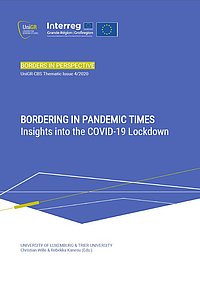
UniGR-CBS Borders in Perspective Vol. 4: Bordering in Pandemic Times
In the course of the COVID-19 pandemic, borders have become relevant (again) in political action and in people's everyday lives within a very short time. This was especially true for the inhabitants of border regions, whose cross-border life worlds were suddenly irritated by closed borders and police controls. However, the COVID-19 pandemic also led to an increased evidence of social, cultural, eco-nomic, health and mobility boundaries beyond national borders.
The authors of this new issue of “UniGR-CBS Borders in Perspective” shed light on these dynamics from the perspective of territorial borders, social boundaries, and (dis)continuities in border regions through a variety of thematic and spatial approaches. Their critical observations and scientific comments were made during the lockdown in April and May 2020 and provide insights into the events during the global pandemic.
Bibliographic information and download
Christian Wille and Rebekka Kanesu (Eds.) (2020): Bordering in Pandemic Times. Insights into the COVID-19 Lockdown. Borders in Perspective, Vol. 4, UniGR-Center for Border Studies, DOI: https://doi.org/10.25353/ubtr-xxxx-b825-a20b
Contents (excerpt):
• Linguistic rebordering: Constructing COVID-19 as an external threat (Eva Nossem)
• "What’s Home Gotta Do With It?" Reflections on Homing, Bordering, and Social Distancing in COVID-19 Times (Astrid M. Fellner)
Live Chat - Master in Border Studies
Online Event for Prospective Students
Live Chat - Master in Border Studies
June 4, 2020 - 11:00 am CET
in English, German, and French
live on Zoom: https://bit.ly/2XqFf4l
Borders are now more important than ever. Why not study Border Studies?! Join us online to find out more about our trinational & trilingual Masters in Border Studies. Here is your opportunity to talk to your future teachers who will tell you about our unique program and answer any questions you may have.
For further information see http://www.uni-gr.eu/en/Master_Border_Studies.
The deadline for application for the Master in Border Studies is June 18, 2020.
CfP "Enlightenment as a 'Battle Term'"
The working group "Enlightenment" seeks proposals for their interdisciplinary conference "ENLIGHTENMENT AS A 'BATTLE TERM': Intellectual strategies and transcultural controversies" to be held on 30 September - 02 October 2020 at Saarland University.
Please send an abstract (German, English or French) for a 25-minute presentation (max. 1 page) and a short scientific CV by 5 April 2020 to:
j.birgfeld@mx.uni-saarland.de
stephanie.catani@uni-saarland.de
a.conrad@mx.uni-saarland.de.
Starting from the Age of the European Enlightenment in the 18th century, the conference aims to examine and connect discourses and practices of the Enlightenment in different disciplines and fields of investigation up to the present day. We welcome contributions that examine literary texts, media strategies or historical events from the perspective of literary studies, theology, history, media theory, and/or cultural studies and with regard to the context of debates on concepts and practices of the Enlightenment.
The conference deliberately focuses on the 'Enlightenment' as a battle term and thus draws attention to the question of how the idea of Enlightenment as well as the language and metaphors associated with it have been used to enforce or combat certain concepts, structures, and practices. In this way, the conference helps to build bridges to current debates, because the international and transcultural significance of the concept of Enlightenment becomes clear precisely at the moment in which it is transferred into a contemporary discourse that renegotiates human self-responsibility in the 21st century and once again raises the question of the “dialectic of Enlightenment” (following Max Horkheimer and Theodor W. Adorno).
Click here for full CfP
Thanks to everyone...

... who participated, who helped, and who - in one way or the other - contributed to the success of
Intersections 2019 - Stonewall 50: Getting out of the Gender and Sexuality Box
12-30 June 2019
Film screenings, talks, lectures, workshops, and a performance!
For more infos see intersections-sb.de
New publication
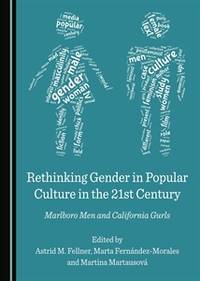
Rethinking Gender in Popular Culture in the 21st Century: Marlboro Men and California Gurls
Edited by Astrid M. Fellner, Marta Fernández-Morales and Martina Martausová
Newcastle upon Tyne: Cambridge Scholars Publishing, 2017.
This book explores popular culture representations of gender, offering a rich and accessible discussion of masculinities and femininities in 21st-century popular media. It brings together contributors from various European countries to investigate the workings of gender in contemporary pop culture products in a brave, original, and rigorous way.
This volume is both an academic proposal and an exercise of commitment to a serious analysis of some of the media that influence us most in our everyday lives. Representation matters, and the position we take as viewers or consumers during reception matters even more.
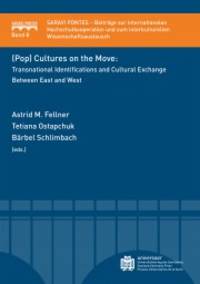
New publication
(Pop-) Cultures on the Move: Transnational Identifications and Cultural Exchange Between East and West.
Ed. by Astrid M. Fellner, Tetiana Ostapchuk and Bärbel Schlimbach
Saarbrücken: Universaar, 2018.
This collection examines how the signifier 'America' functions as an intermediary in the production of transnational identities and analyzes how different forms of cultural exchange between 'East' and 'West' are constituted in literary and cultural texts. In particular, the essays investigate the transnational flow of cultural texts, analyzing how, by whom, and to what purposes and effects (pop)cultural practices have been appropriated and transferred to local contexts and how the significance of place, especially the category of the national, has changed in the process. Analyzing various spaces of cultural transmission, the articles focus on patterns of movement and the flows of culture in order to approximate the question of whether the dialogue with 'America' in the 21st century still plays a vital role in the production of 'European' identities. What specific role does the flexibility and adaptability of the signifier 'American' play in this intermediary function of American culture? This book therefore gauges the potential and the limits of 'American' culture as a third term that can 'other' both national and European traditions (for identification or dis-identification) and can serve to reconstruct and to transgress national cultural identities.
